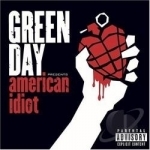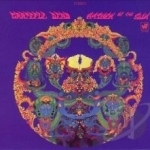Search
Daniel Boyd (1066 KP) rated American Idiot by Green Day in Music
Nov 2, 2017
Soda Pop & Ritalin
For some reason people like to slag Green Day, they are the butt of a lot of punk music jokes and to be honest I do get why. I understand why people see their use of makeup and their whole zany persona as a farce and don’t take them seriously, but no matter what you think of them in general, it is hard to deny that their seventh album, ‘American Idiot,’ perfectly captured the zeitgeist at the time, especially in the US. The album was an unexpected maturation of any of the band’s previous efforts and capitalised on their potential. When Billie Joe Armstrong wrote the album, he chose to channel his feelings into a cast of various characters and use a concept album format to display the emotions he and his peers felt at the time. I would argue the fact that American Idiot is definitively a concept album, as it doesn’t actually tell a cohesive story with a beginning, middle and end, instead opting for the approach of latching on to a certain feeling, whether it be rage or love and assigning that to a specific character and then throwing all of these characters into the mixing pot together. We hear the album from the perspective of the protagonist in the story, Jesus Of Suburbia, a young man who is sick of a broken system and feels disillusioned and uninspired by everything that he sees around him. The reason that so many people felt this way at the time of this album’s release, 2004, was due to the Bush administration’s misguidance and outright lies and due to the fallout from the 9/11 terrorists attacks that has never really gone away in America since the incident occurred. So, fed up of his suburban, dead end town Jesus leaves home and begins a quest of self discovery that involves a great deal of substance abuse, which ends up leading to the creation of an alter ego residing in Jesus’ mind who calls himself Saint Jimmy. Think Tyler Durden in fight club, but if he had a Mohican and ear stretchers. Jimmy leads Jesus on the thinly veiled path to revolution, which simply turns out to be a path to self destruction and eventually when Jesus hits rock bottom, (just like Fight Club,) he forces Jimmy to commit suicide and rids his mind of him. At the end of the album though Jesus’ fate is left ambiguous, but what is clear is that his journey has taken its toll on him, which is signified by the fact that he forgets the name of the girl that he fell in and out of love with during his spiritual quest. This album perfectly captured the mindset of a generation of kids forgotten by the system that was put in place to help them grow. American Idiot gives the man on the street a well informed, unified voice and actually injects some form of leadership into the political and social landscape at the time, even if it probably isn’t the form of leadership that your parents had in mind, or the government had put in place for you. A wake up call that is essential and still relevant today, this album and its story and character carries the important message that we shouldn’t settle for any less than what we deserve and what we deserve is often a lot better than what we end up getting. This album is pretty much the American version of Never Mind The Bollocks.

